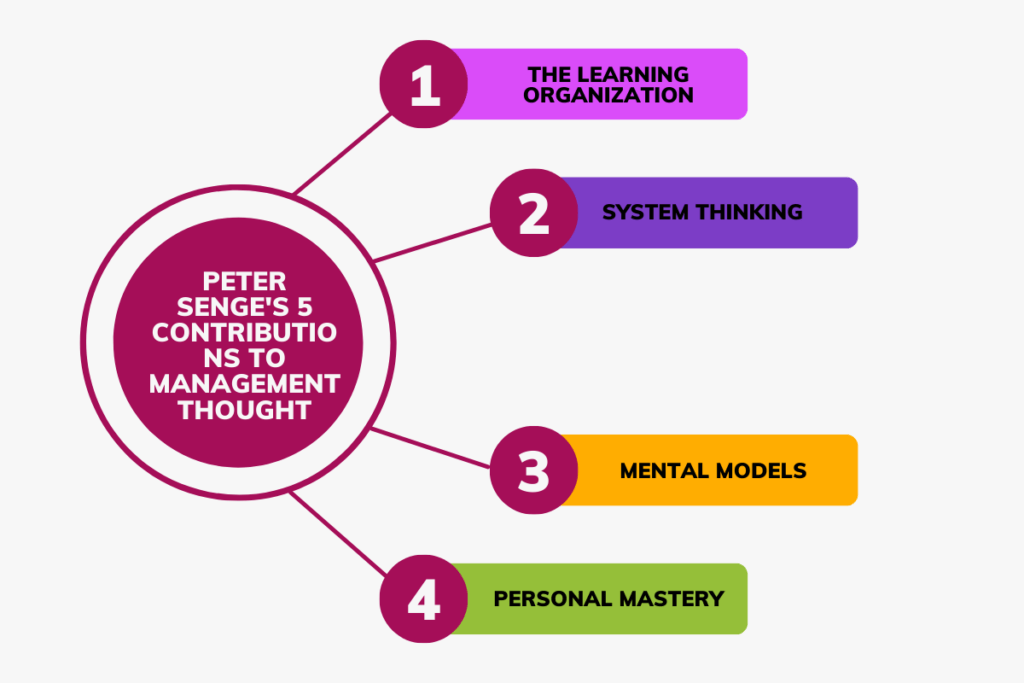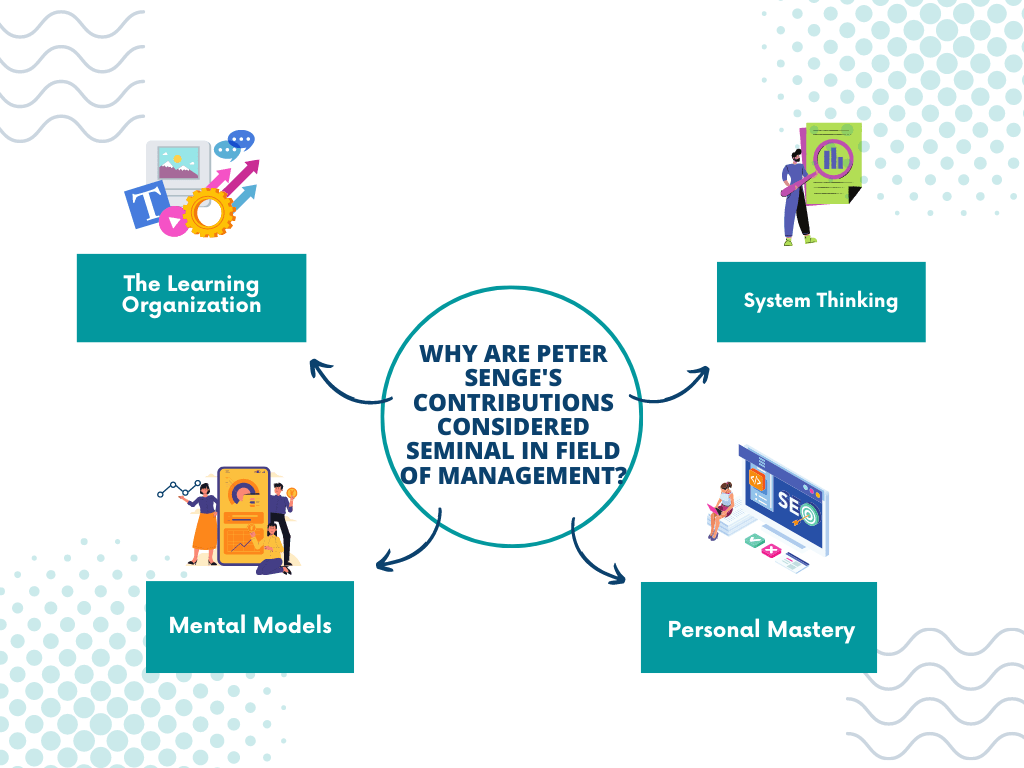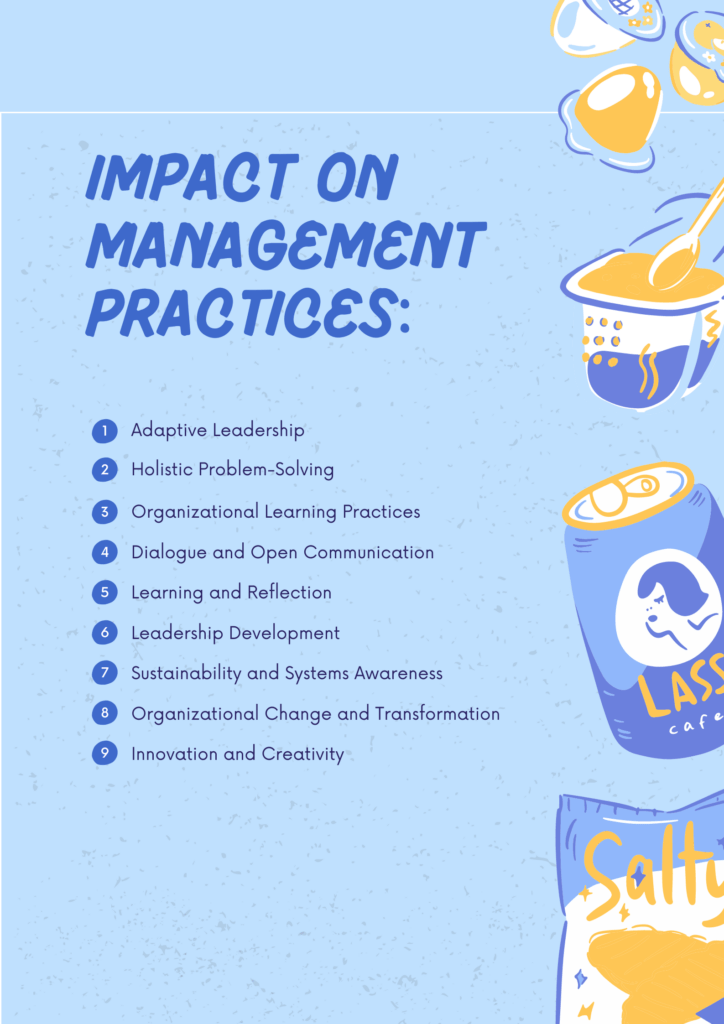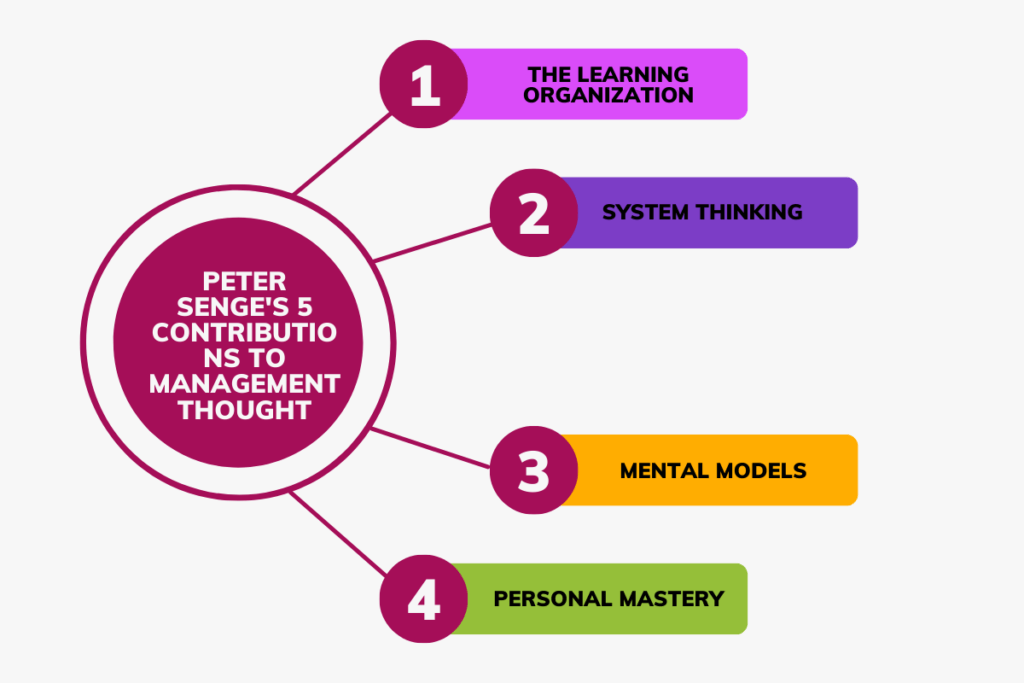Introduction
Peter Senge’s contribution to the field of management is undeniable. An accomplished author, scholar, and systems thinker, he has made significant contributions to the field of management thought and practices. With an emphasis on organizational learning, Senge’s groundbreaking ideas have challenged conventional wisdom, reshaped management strategies, and brought about a paradigm shift in how organizations function. In this blog, we will explore the history, seminal contributions, and lasting impact of Peter Senge’s work on management.
Early Years and Background
Peter Senge was born in 1947 in Stamford, Connecticut. He obtained his Ph.D. in Management from MIT Sloan School of Management in 1978. Senge initially focused on understanding how people learn and how learning can be integrated into organizational structures. This quest led him to develop the concept of the learning organization, which has become one of his most influential contributions.
Peter Senge’s 5 Contributions to Management Thought

1. The Learning Organization
Senge’s concept of the learning organization, introduced in his bestselling book “The Fifth Discipline” (1990), revolutionized how businesses viewed organizational learning. Senge argued that organizations should encourage and facilitate continuous learning among individuals, teams, and the organization as a whole. By fostering a culture of shared learning and collective intelligence, organizations can adapt and thrive in an ever-changing environment.
Senge emphasized five disciplines that organizations should cultivate to become learning organizations:
– Systems Thinking: Senge stressed the importance of understanding organizations as complex systems with interdependent elements. This systems thinking approach helps managers recognize and address systemic issues rather than merely treating symptoms.
– Personal Mastery: Peter Senge’s believed that personal mastery is a cornerstone of organizational learning. By encouraging individuals to pursue personal growth and lifelong learning, organizations empower their employees to reach their full potential and contribute to the collective success.
– Mental Models: Peter Senge’s work highlighted the significance of mental models—the deeply ingrained, unconscious beliefs, and assumptions that influence perception and behavior. By encouraging individuals to question and challenge their mental models, organizations can unlock untapped potential and foster creativity and innovation.
– Shared Vision: Peter Senge’s emphasized the importance of developing a shared vision that aligns individual goals with organizational objectives. A compelling vision helps create a sense of purpose, fosters alignment, and motivates individuals to work towards a common goal.
– Team Learning: Peter Senge’s emphasized the power of collective learning and encouraged strong collaboration within teams. By facilitating open dialogue, promoting active listening, and nurturing a culture of psychological safety, organizations can harness the collective intelligence of their teams.
2. System Thinking
Peter Senge’s work on system thinking challenged the reductionist approach prevalent in traditional management practices. He emphasized that organizations are complex systems comprising interdependent parts. Understanding and managing these interrelationships is crucial for long-term success. Senge pioneered the application of system thinking to management practices, enabling managers to chart a holistic view of their organization and make informed decisions.
System thinking allows managers to analyze complex problems by considering the interconnections and feedback loops between various elements of a system. By taking a systemic perspective, managers can identify underlying causes, devise more effective solutions, and avoid unintended consequences. This approach enables organizations to tackle complex challenges with a more comprehensive and sustainable approach.
3. Mental Models
Senge highlighted the significance of mental models—the deeply ingrained, unconscious beliefs, and assumptions that influence perception and behavior. By encouraging individuals to question and challenge their mental models, organizations can unlock untapped potential and foster creativity and innovation. Senge believed that by embracing diverse perspectives and challenging existing mental models, organizations can facilitate better decision-making and adapt to change more effectively.
Senge’s concept of mental models encourages individuals to cultivate a growth mindset, which is essential for personal and organizational growth. By continuously questioning assumptions and exploring different viewpoints, individuals can overcome cognitive biases and embrace new possibilities.
4. Personal Mastery
Personal mastery is a cornerstone of Senge’s philosophy, emphasizing individual commitment to lifelong learning and personal growth. Senge believed that personal mastery, combined with a collective vision, can empower individuals to shape their own destiny, leading to greater organizational success. Cultivating personal mastery involves fostering self-awareness, developing new skills, and aligning personal values with organizational goals.
When individuals within an organization strive for personal mastery, they become catalysts for change and inspire others to do the same. By creating a culture that promotes personal growth and professional development, organizations not only enhance employee satisfaction but also foster a continuous learning environment that drives innovation and adaptability.
Why are Peter Senge’s Contributions considered Seminal in field of Management?
The contributions of Peter Senge’s to the field of management are widely regarded as seminal due to their profound and lasting impact on how organizations operate and adapt. Let’s delve into the reasons why these contributions are considered groundbreaking and transformative:

1. The Learning Organization: Senge’s concept of the learning organization is a seminal contribution to the field of management. Prior to Senge’s work, organizations primarily focused on efficiency, control, and problem-solving. Senge, however, emphasized the importance of continuous learning as a means to adapt and thrive in a constantly evolving business environment.
The concept of the learning organization revolutionized management practices by promoting a culture of shared learning, collaboration, and collective intelligence. By encouraging organizations to harness the knowledge and insights of their employees, Senge’s ideas paved the way for a more dynamic and adaptive approach to managing organizations.
2. System Thinking: Senge’s work on system thinking challenged the reductionist approach prevalent in traditional management practices. He emphasized that organizations are complex systems with interconnected parts, where small changes in one area can have significant ripple effects throughout the system.
By introducing system thinking into management thinking, Senge provided a framework for understanding the interdependencies and feedback loops that shape organizational dynamics. This holistic approach allows managers to identify underlying causes, analyze the system as a whole, and make informed decisions that address the root causes of problems rather than just the symptoms. This shift in perspective has had a transformative effect on how organizations approach problem-solving and decision-making.
3. Mental Models: Senge’s emphasis on mental models brought attention to the powerful role of unconscious beliefs and assumptions in shaping individual and organizational behavior. By encouraging individuals to question and challenge their mental models, Senge invited managers to explore alternative perspectives and broaden their thinking.
Challenging mental models enables individuals and organizations to break free from rigid thinking patterns and embrace new possibilities. This aspect of Senge’s work has been instrumental in fostering creativity, innovation, and adaptability. By encouraging individuals to examine their assumptions and biases, organizations can create a more inclusive and open-minded culture that is receptive to change and continuous improvement.
4. Personal Mastery: Senge’s emphasis on personal mastery as a key component of organizational success is another seminal contribution. Personal mastery refers to an individual’s commitment to lifelong learning, personal growth, and the pursuit of excellence.
By fostering a culture that encourages personal mastery, organizations empower their employees to reach their full potential. This, in turn, leads to increased employee engagement, motivation, and creativity. Personal mastery fosters a sense of ownership and responsibility among employees, inspiring them to continuously improve their skills, develop expertise, and align their personal values with organizational objectives. This alignment between personal and organizational goals cultivates a high-performance culture that propels the organization forward.
The combined impact of these contributions has transformed management practices in multiple ways. Organizations have shifted their focus from a command-and-control approach to one that values collaboration, continuous learning, and adaptability. Senge’s ideas have influenced the design of organizational structures, governance systems, and leadership practices, with an emphasis on promoting a learning culture, nurturing employee growth, and embracing change.
Impact on Management Practices:

1. Adaptive Leadership:
Peter Senge’s emphasis on organizational learning enabled the rise of adaptive leadership practices. In a rapidly changing world, adaptive leaders prioritize collaboration, communication, and continuous learning. They encourage teams to experiment, embrace failure as an opportunity for growth, and cultivate a learning mindset throughout the organization.
Adaptive leaders also leverage system thinking to anticipate and navigate challenges effectively. They recognize the dynamic and interconnected nature of the business landscape and approach leadership as a learning journey, constantly adapting their strategies and approaches based on feedback and new information.
2. Holistic Problem-Solving:
Senge’s system thinking approach has transformed the way organizations analyze and solve complex problems. By considering the interconnections between various elements of a system, managers can identify and address the underlying causes rather than treating symptoms. This holistic problem-solving approach enables organizations to design more effective solutions and avoid unintended consequences.
By adopting a systems perspective, organizations can tackle issues from a broader and more comprehensive standpoint. This approach promotes a more thorough understanding of the problem at hand, allowing for innovative and sustainable solutions that consider all relevant aspects of the organization.
3. Organizational Learning Practices:
Peter Senge’s work laid the foundation for the establishment of various knowledge management and organizational learning practices. Companies now invest in creating learning platforms, knowledge-sharing systems, and communities of practice to foster continuous learning, collaboration, and innovation. These practices help drive employee engagement, strengthen organizational resilience, and promote a culture of continuous improvement.
Organizations that embrace Peter Senge’s ideas on organizational learning create structures and processes that facilitate knowledge exchange, encourage exploration of new ideas, and provide opportunities for experimentation and reflection. These practices support the development of a learning culture and enable organizations to adapt and grow in response to market changes and evolving customer needs.
4. Dialogue and Open Communication
Senge emphasized the importance of dialogue and open communication within organizations. He advocated for creating spaces where individuals can engage in thoughtful, open-ended conversations and exchange ideas without judgment or hierarchy. This approach fosters a culture of learning, collaboration, and innovation, as it encourages diverse perspectives and allows for the emergence of creative solutions to complex problems.
5. Learning and Reflection
Building on the concept of the learning organization, Peter Senge’s encouraged organizations to prioritize learning and reflection at all levels. This includes encouraging employees to engage in regular self-reflection, actively seeking feedback, and engaging in continuous learning opportunities. By developing a learning mindset and regularly reflecting on experiences, individuals and organizations can identify areas for improvement, adapt to changes, and continuously innovate.
6. Leadership Development
Peter Senge’s work highlighted the importance of leadership development and the role of leaders in fostering a learning culture within organizations. He emphasized that leaders should act as role models for continuous learning, personal mastery, and systems thinking. By investing in leadership development programs, organizations can equip their leaders with the skills and mindset needed to create a conducive learning environment, promote collaboration, and navigate complex challenges.
7. Sustainability and Systems Awareness
Peter Senge’s emphasis on systems thinking extends to the realm of sustainability. He argued that organizations must consider the interconnectedness of social, economic, and environmental systems in their decision-making processes. By adopting a holistic approach, organizations can identify and address the long-term impacts of their operations, ensuring that their practices align with the principles of sustainability and contribute positively to society.
8. Organizational Change and Transformation
Peter Senge’s ideas have had a significant impact on how organizations approach change and transformation. His emphasis on organizational learning, shared vision, and dialogue provides a solid foundation for successfully navigating change. By involving all stakeholders in the change process, encouraging open communication, and fostering a learning culture, organizations can effectively manage transitions, mitigate resistance, and create a sense of ownership and commitment among employees.
9. Innovation and Creativity
Peter Senge’s work on mental models and personal mastery has influenced how organizations approach innovation and creativity. By challenging existing mental models, organizations can overcome traditional thinking patterns and embrace new ideas and perspectives. Senge encouraged organizations to provide a supportive environment that fosters creativity, experimentation, and risk-taking. This approach allows individuals to think outside the box, explore novel solutions, and contribute to the organization’s innovative endeavors.
Conclusion:
Peter Senge’s contributions to management thought and practices have had a profound and lasting impact on how organizations operate and adapt in today’s dynamic business environment. By championing learning organization, system thinking, personal mastery, and challenging mental models, Senge has provided managers with a roadmap to navigate the complexities of the modern world. As organizations continue to evolve, Peter Senge’s teachings remain relevant, reminding us of the power of learning and adaptation in driving sustainable success in the long run.
Samrat is a Delhi-based MBA from the Indian Institute of Management. He is a Strategy, AI, and Marketing Enthusiast and passionately writes about core and emerging topics in Management studies. Reach out to his LinkedIn for a discussion or follow his Quora Page

